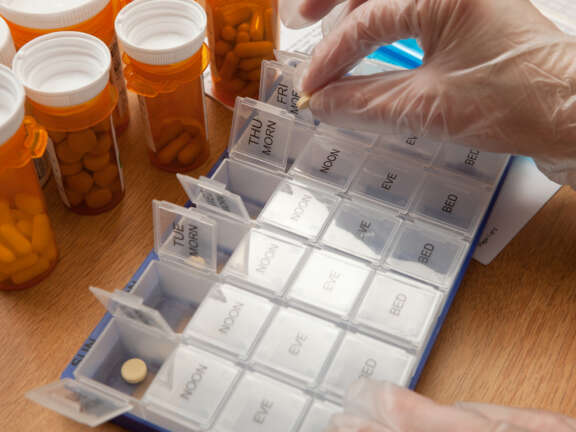Why Taking Your Medications as Prescribed Matters


Life can get hectic, and with everything we need to remember to do each day it can be easy to overlook taking your medications or refilling prescriptions. Plus, the cost of prescriptions can add to the stress and the instructions can sometimes be confusing.
Yet, while not taking your medications as prescribed can seem like a small thing, it can have a big impact on your health. Here’s a closer look at what happens when you don’t take your medications regularly, along with tips to help you remember to take your prescriptions, manage costs, and achieve the best health outcomes possible.
What Happens When You Don’t Take Your Medications
It’s estimated that more 25% of first-time prescriptions in the U.S. go unfilled. Plus, more than half of all medications prescribed for chronic conditions aren’t being taken as advised. Not taking your medications regularly can:
- Reduce Their Effectiveness: Medications work best when you take them regularly. If you skip doses, they may not work as well as they should or at all. Not taking your diabetes medication, for example, can cause your blood sugar to rise—increasing your risk of diabetic complications like heart attacks, strokes, eye disease, and more. Or skipping doses of your cholesterol-lowering statins can boost your risk of having a heart attack or stroke.
- Worsen Your Symptoms: With some medications, missing doses can cause your symptoms to come back or get worse. For example, not taking your blood pressure medication can lead to headaches and brain fog, as well as increasing your chances of having a heart attack, stroke, or kidney failure.
- Make Health Issues Tougher to Treat: In some cases, especially with antibiotics, skipping doses can lead to drug resistance. This means the bacteria causing the infection may no longer respond to the medication, making it harder to treat in the future.
- Cause Complications and Side Effects: Not taking your medications as directed can lead to complications, some of which can be severe. For instance, if you suddenly stop taking a medication like Xanax or Valium, you might experience heart palpitations or panic attacks. Or missing a dose of epilepsy medication may trigger a seizure.
- Lead to Higher Medical Costs: Sticking to your medication plan and refilling your prescriptions regularly can save you money in the long run. If you manage your conditions well, you may avoid expensive visits to the hospital and extra treatments.
How to Remember to Take Your Medications
Staying on track with your medication can be easier than you might think. Here are some practical tips to help you stick to your medication plan:
- Organize Your Medications: Use a pill organizer with compartments for each day of the week or times of day. This makes it easy to see if you’ve taken your medications. Plus, keep them in a place you’ll see them regularly, such as in the kitchen or on the bathroom vanity.
- Use Medication Reminders: If you have an alarm clock or smart phone, you can set up reminders to alert you when it’s time to take your medications. Or you can keep a calendar where you mark off each dose as you take it.
- Make It a Routine: Taking your medications at the same time each day, such as right before you brush your teeth or after you eat breakfast, can make it easier to remember to take your meds.
Tips to Avoid Running Out
To make sure you don’t run out of your medications, ask your health care provider to write your prescriptions for a 90- or 100-day supply, so you need to get fewer refills.
Also, check to see if your pharmacy has an auto refill program where your prescriptions will automatically be refilled before you run out. Some pharmacies will send you a text message or give you a call when your prescription is ready to be picked up. Others may have an app you can put on your phone to keep track of your prescription refills.
You can also check with your medical insurance provider to see if you have mail order benefits. That way your medications will be shipped directly to your home.
Working with Your Medical Provider
Beyond remembering, there may be other issues that are keeping you from taking your medications. Therefore, it’s important to work closely with your health care provider.
- Ask Questions: Don’t be afraid to ask why you’re taking a specific medication, what side effects to expect, and how often you should take it. Make sure you know if it should be taken in the morning or evening, with food or on an empty stomach, and any other special instructions.
- Talk About Costs: If a medication is too expensive, let your provider know. They may be able to prescribe a less expensive alternative or provide information about prescription discounts.
- Check the Prescription Bottle: Always check to see if what’s written on the prescription bottle matches what you’re taking at home. If it doesn’t, call or send a portal message to your health care provider right away.
- Don’t Wait to Speak Up: Don’t wait for your next office visit to ask questions about your medications. Delaying can lead to missed doses, which can affect your health. For example, skipping a diabetes medication can raise your blood sugar, and not refilling your blood pressure medication can increase your heart attack and stroke risk.
Don’t hesitate to call your provider or reach out through the Innovista patient portal to discuss any medication issues or to request prescription refills. Staying on track with your medications is important for maintaining your health and well-being.
